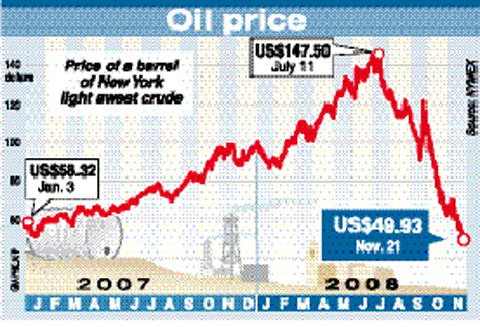Oil prices collapsed this week to under US$50, their lowest levels in almost four years, as the market focused on the threat of a global recession and tumbling energy demand.
Base metals aluminum and copper also hit their worst levels for more than three years as traders fretted about weaker demand from struggling automakers in the US.
“The deterioration in the global economic outlook had led to a significant decline in commodity prices and, most notably, energy and industrial metal prices,” Deutsche Bank analyst Michael Lewis said. “It has also led to a significant increase in inventories, for example across the industrial metals complex.”

Oil prices have plunged two-thirds since striking record highs above US$147 in July when fears of supply disruptions had helped to send them into orbit.
The fall below US$50 reflects an assumption that demand will be affected not only in Western countries but in China and India, whose rapid growth was also a major force pushing prices to record highs earlier this year, Jason Feer of energy market analysts Argus Media said.
“The market is fully internalizing the realization that the coming recession is going to be pretty significant and is likely to affect demand in some of the emerging countries that have been propping up the market,” Feer said.
Analysts said sentiment has been hammered by an unrelenting series of bad economic data in the US, the world’s biggest energy consumer.
The eurozone is already in recession — defined as two successive quarters of negative economic growth.
Action should meanwhile be taken to halt the decline in oil prices, Libya’s OPEC representative told reporters on Friday.
Nevertheless, Shukri Ghanem — the head of Libya’s national oil firm and its envoy to the OPEC oil cartel — did not explicitly repeat his call for oil production to be cut when the organization meets in Cairo next Saturday.
Ghanem said the group should examine whether the fall in prices was the result of weaker consumption or of speculators liquidating their positions in the market.
“The oil market needs some kind of action,” he said. “Of course the falling price hits our earnings but we’re not worried because it can’t last. We expect a turnaround.”
Last month, OPEC, which produces 40 percent of world oil, decided at an emergency meeting to slash its official oil output quota by 1.5 million barrels a day from Nov. 1.
The London-based Centre for Global Energy Studies on Tuesday forecast a contraction in global demand for the first time in 25 years.
By Friday, light, sweet crude for January delivery rose US$0.51 to settle at US$49.93 a barrel on the New York Mercantile Exchange. Earlier, in electronic trading, the price dipped to US$48.25, the lowest level since May 18, 2005.
In London, January Brent crude rose US$1.17 to settle at US$49.19 on the ICE Futures exchange.

MORE VISITORS: The Tourism Administration said that it is seeing positive prospects in its efforts to expand the tourism market in North America and Europe Taiwan has been ranked as the cheapest place in the world to travel to this year, based on a list recommended by NerdWallet. The San Francisco-based personal finance company said that Taiwan topped the list of 16 nations it chose for budget travelers because US tourists do not need visas and travelers can easily have a good meal for less than US$10. A bus ride in Taipei costs just under US$0.50, while subway rides start at US$0.60, the firm said, adding that public transportation in Taiwan is easy to navigate. The firm also called Taiwan a “food lover’s paradise,” citing inexpensive breakfast stalls

TRADE: A mandatory declaration of origin for manufactured goods bound for the US is to take effect on May 7 to block China from exploiting Taiwan’s trade channels All products manufactured in Taiwan and exported to the US must include a signed declaration of origin starting on May 7, the Bureau of Foreign Trade announced yesterday. US President Donald Trump on April 2 imposed a 32 percent tariff on imports from Taiwan, but one week later announced a 90-day pause on its implementation. However, a universal 10 percent tariff was immediately applied to most imports from around the world. On April 12, the Trump administration further exempted computers, smartphones and semiconductors from the new tariffs. In response, President William Lai’s (賴清德) administration has introduced a series of countermeasures to support affected

CROSS-STRAIT: The vast majority of Taiwanese support maintaining the ‘status quo,’ while concern is rising about Beijing’s influence operations More than eight out of 10 Taiwanese reject Beijing’s “one country, two systems” framework for cross-strait relations, according to a survey released by the Mainland Affairs Council (MAC) on Thursday. The MAC’s latest quarterly survey found that 84.4 percent of respondents opposed Beijing’s “one country, two systems” formula for handling cross-strait relations — a figure consistent with past polling. Over the past three years, opposition to the framework has remained high, ranging from a low of 83.6 percent in April 2023 to a peak of 89.6 percent in April last year. In the most recent poll, 82.5 percent also rejected China’s

PLUGGING HOLES: The amendments would bring the legislation in line with systems found in other countries such as Japan and the US, Legislator Chen Kuan-ting said Democratic Progressive Party (DPP) Legislator Chen Kuan-ting (陳冠廷) has proposed amending national security legislation amid a spate of espionage cases. Potential gaps in security vetting procedures for personnel with access to sensitive information prompted him to propose the amendments, which would introduce changes to Article 14 of the Classified National Security Information Protection Act (國家機密保護法), Chen said yesterday. The proposal, which aims to enhance interagency vetting procedures and reduce the risk of classified information leaks, would establish a comprehensive security clearance system in Taiwan, he said. The amendment would require character and loyalty checks for civil servants and intelligence personnel prior to